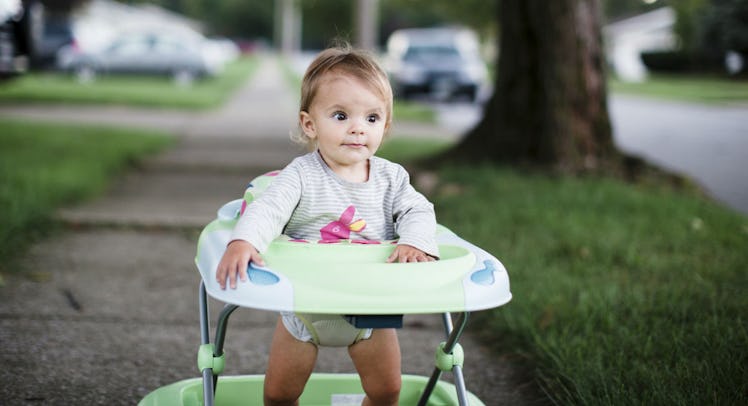Doctors Plea For Ban on Child Walkers as Injuries Pile Up
More than 250,000 kids have been hurt in walkers since 1990.

Despite what your parents and grandparents tell you, baby walkers are dangerous. They just are. And it doesn’t matter that you used one as a baby and never got hurt. How and why they’re still being sold is anybody’s guess, but the fact remains, unwitting parents continue to use them and in the process are put their children at risk. Every year, emergency rooms treat around 2,000 babies for injuries sustained while using a baby walker. And it’s these numbers that have once again prompted pediatricians to push to have ban walkers banned.
For the record, we’re not talking about push toys that toddlers stand behind to use for balance when learning to walk. Those are different and completely safe. We’re talking about baby walkers, those wheeled Fred Flinstone carts in which a baby comfortably sits and walks themselves around the house, and often down a flight of stairs.
Per a study published in the journal Pediatrics on Monday, walkers have caused more than a quarter of a million babies under 15-months-old to be treated for broken bones, concussions, and skull fractures between 1990 and 2014. Walkers are meant to help kids stretch their tiny legs without expending too much effort, since the seat keeps them upright and the wheels help them glide around. Unfortunately, more often than not, they glide themselves right out the doorway.
Thankfully, a lot of parents have heeded the warnings. While 2,000 injuries a year is still a lot, that number is way down from 1990 when walkers injured around 21,000 babies. It was around that time that doctors and consumer safety groups first pushed for a ban on them. Instead of getting rid of them all together, however, higher testing standards and safety protocols like emergency brakes were introduced. By 2003, the number of babies being injured by walkers had dropped dramatically to 3,200. But even though the number keeps dropping, doctors aren’t sold.
“Despite this great success, there are still 2,000 children a year being treated for injuries, many of them serious injuries, in emergency departments,” Dr. Gary Smith, the study’s senior author. “Therefore, we support the position of the American Academy of Pediatrics that baby walkers should not be sold or used. There’s absolutely no reason these products should still be on the market.”
Crazier still, walkers don’t actually help babies learn to walk any faster. They can even slow down the process of learning to walk because half of walking is using your eyes to know where you and your feet are. If you can’t see your feet because of a walker than you’re slowing down half the process of learning.